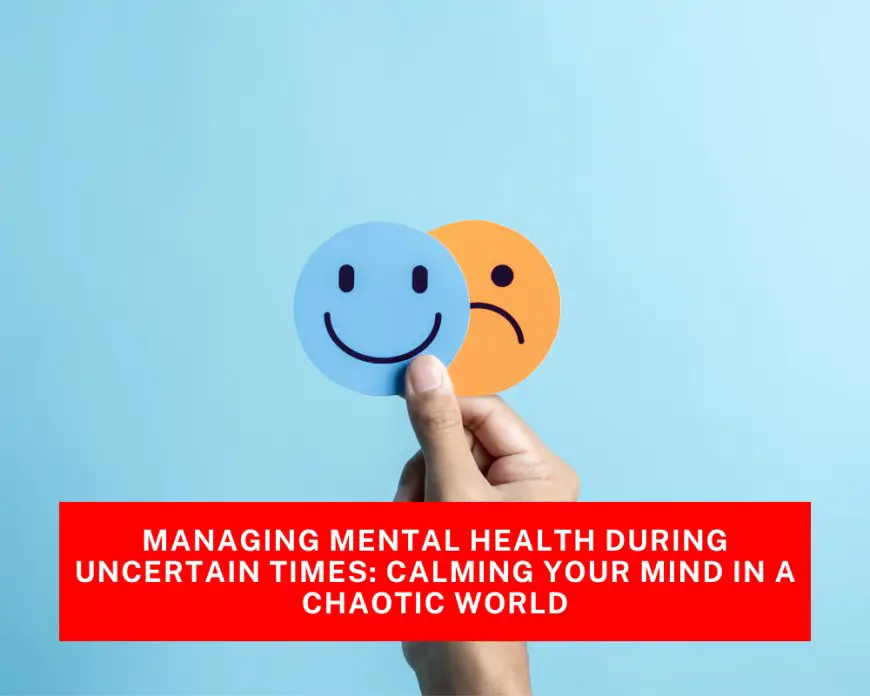Managing Mental Health During Uncertain Times: Calming Your Mind in a Chaotic World
Feeling overwhelmed by uncertainty? Learn how to manage anxiety, cope with stress, and prioritize your mental health during challenging times.

The world seems to be a constant whirlwind these days. From global events to personal challenges, uncertainty can cast a long shadow, impacting our mental well-being. But fear not, you're not alone. Feelings of anxiety, worry, and stress are natural responses to unpredictable situations. The key lies in developing healthy coping mechanisms to navigate these uncertain times and prioritize your mental health.
Understanding the Impact of Uncertainty
Uncertainty triggers our fight-or-flight response, a primal survival mechanism. This can lead to:
l Increased anxiety: The unknown can fuel worry and make it difficult to relax.
l Difficulty concentrating: Constant mental churning can disrupt focus and productivity.
l Emotional volatility: Feelings of frustration, anger, or sadness may surface more readily.
l Sleep disturbances: Anxiety can disrupt sleep patterns, leading to fatigue and irritability.
l Coping with Uncertainty: Practical Strategies
While we can't control external circumstances, we can control our response. Here are some effective strategies to manage your mental health in uncertain times:
l Acknowledge your feelings: Don't bottle up your emotions. Talk to a trusted friend, family member, or therapist. Journaling can also be a helpful outlet.
l Focus on what you can control: Make a list of things within your sphere of influence, like daily routines, healthy habits, and self-care practices.
l Practice mindfulness: Techniques like meditation and deep breathing can help anchor you in the present moment and reduce anxiety.
l Limit news consumption: Constant exposure to negativity can exacerbate fear. Choose reliable sources and limit your intake to specific times.
l Maintain a healthy routine: Regular sleep schedules, balanced meals, and physical activity are crucial for emotional well-being.
l Connect with loved ones: Strong social connections provide a sense of belonging and support during challenging times.
l Practice gratitude: Shifting your focus to things you're grateful for can cultivate a positive outlook.
l Building Resilience: Long-Term Strategies
Developing resilience allows you to bounce back from challenges and adapt to change. Here are some practices to consider:
l Challenge negative thoughts: Don't let worst-case scenarios hijack your thinking. Identify and reframe unhelpful thought patterns.
l Develop coping skills: Learn relaxation techniques like progressive muscle relaxation or guided imagery to manage stress.
l Practice self-compassion: Be kind to yourself. Uncertainty is stressful; it's okay to not have all the answers.
l Focus on personal growth: View challenges as opportunities to learn and develop new skills.
l Seek professional help: If you're struggling to cope, don't hesitate to seek help from a therapist or counselor.
Remember, you are not alone. Many resources are available to support your mental health during uncertain times. Here are some helpful links:
National Alliance on Mental Illness (NAMI): https://www.nami.org/
Anxiety and Depression Association of America (ADAA): https://adaa.org/
MentalHealth.gov: https://www.samhsa.gov/
By incorporating these strategies into your life, you can build your emotional resilience and navigate uncertain times with greater peace of mind. Remember, taking care of your mental health is an ongoing journey. Be patient with yourself, celebrate your progress, and don't be afraid to seek support when needed.

 Sumita Dutta
Sumita Dutta 






